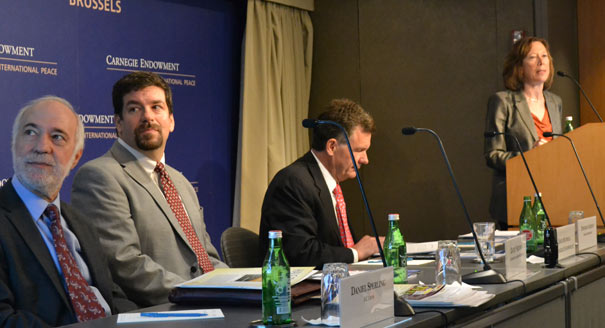Registration
Thank you!
You will receive an email confirming your registration.
IMGXYZ3940IMGZYXCarnegie’s David Burwell moderated a discussion marking the release of a new paper by Deborah Gordon, Daniel Sperling, and David Livingston entitled A Policy Framework for Electric Vehicles.
A Key Moment for the U.S. Electric Vehicle Market
Gordon outlined the crucial forces promoting and suppressing the wholesale adoption of electric vehicles, and the policies needed to secure a greater market share for PEVs.
- The Urgency of Electric Vehicles: Renewed investments in oil-fueled transportation, in large part due to unconventional oil, are locking in gasoline as the future status quo fuel. Still, new vehicle fuel economy standards, climate regulations, and uncertainty in gasoline prices could encourage an increase in electric-drive vehicles.
- Unconventional Oil Usurping Electricity as an Alternative Fuel: Economics and technology are redefining liquid hydrocarbon resources. Many of these new unconventional oils are replacing would-be renewable sources as alternative transport fuels. Rather than spurring success for PEVs, higher gasoline prices may instead expand the volumes and types of oils in the marketplace. Such a shift will likely reduce the competitiveness of electric vehicles.
- The Need for Durable Policy: The road toward wholesale PEV adoption must engage motorists, local decision makers, and auto dealers through a mixture of strategic approaches. Robust policy should motivate PEV manufacturers through policy reforms, like a reformulated electric vehicle consumer tax credit. It should also promote PEV interaction with electricity providers through investment in recharging infrastructure.
- Let State and Local Innovation Lead: Innovation on low-carbon PEVs at the state and local levels should be showcased to advance PEVs in uncommitted states. Benchmarking states and target programs in PEV vanguard cities can also help to cultivate PEV clusters in regions with low-carbon electricity. Federal policies are necessary, but are not sufficient; state and local policies are needed to expand PEVs.
The Evolution, not Revolution, of PEV Progress
Friedman provided an analysis of the supply-side actions needed to accelerate the market for electric vehicles.
- Looking Beyond the Hype of PEVs: Electric vehicle use necessitates a steady course of progress rather than an overnight auto revolution. The market share of electric vehicles is accelerating gradually, nearly tripling from 2011 to 2012 estimates. By 2035, the market share for plug-in vehicles might be as high as 40 percent, depending on increased investment and strengthened vehicle standards after 2025. On average, regardless of climate geography, PEVs range from on-par to significantly better than hybrid vehicles in greenhouse gas emissions.
- Cleaning up the Electricity Grid: Strengthening renewable electricity standards (RES) at the state and federal levels will help to set hard targets for diversifying electricity supply, reducing pollution, and accelerating the proliferation of PEVs. Using renewable electricity from a smart grid will further decrease emissions from PEVs.
- Enabling Access to Reasonable Rates: Educating consumers on unique ‘time of use rates’ to take advantage of inexpensive electricity during non-peak hours is a key way of enabling such equitable access to reasonable rates. By charging electric vehicles at night, consumers can benefit from much lower electricity rates. Requiring reasonable PEV rates and streamlining smart solutions for separate PEV charging meters can also aid in facilitating access to cost-effective PEV use.
Policy Priorities for a Low Carbon Path: California
Sperling highlighted the role states and localities must play in providing durable solutions, using the experience of California as an example.
- New State Policy Promoting PEVs: The state of California is taking a step beyond new Corporate Average Fuel Economy (CAFE) standards on greenhouse gas emissions. The new 54 miles per gallon by 2025 regulation will not stimulate significant PEV sales without additional policy changes. Existing Policies Supporting PEVs: The Law Carbon Fuel Standard (2009) sets performance standards for reducing transportation fuel carbon intensity by ten percent in 2020 and recognizes electricity as a low-carbon fuel. The 2012 Zero Emissions Vehicles (ZEVs) Program Action Plan has, for the first time, put in place more aggressive standards for future electric vehicle shares. These policies, combined with other actions taken by the California government in support of low-carbon transportation, including carpool lanes, consumer tax credits, and funding sources, create a strong foundation for future development.
- Building Infrastructure to Support PEVs: Governor Edmund G. Brown, Jr. of California has allocated 100 million dollars to constructing charging stations to support the estimated 1.5 million zero-emission vehicles that must be on California roads by 2025, according to a 2012 executive order. Streamlining the process of approving and constructing effectively placed workplace and public chargers will help PEVs expand not only in California, but across the United States.
